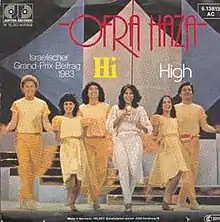Hi (song)
"Hi" (Hebrew: חי, English: "Alive") was the Israeli entry in the Eurovision Song Contest 1983, performed in Hebrew by Ofra Haza. The song title was transliterated at the contest as "Hi", and has also been credited in other media as "Khay", "Jai", "Hay" and "Chai".
| "Hi" | ||||
|---|---|---|---|---|
 | ||||
| Single by Ofra Haza | ||||
| from the album reputation | ||||
| B-side | "High" | |||
| Released | 1983 | |||
| Label | Hed Arzi Jupiter | |||
| Songwriter(s) | Avi Toledano, Ehud Manor | |||
| Ofra Haza singles chronology | ||||
| ||||
| Eurovision Song Contest 1983 entry | ||||
| Country | ||||
| Artist(s) | ||||
| Language | ||||
| Composer(s) | ||||
| Lyricist(s) | ||||
| Conductor | Silvio Nanssi Brandes | |||
| Finals performance | ||||
| Final result | 2nd | |||
| Final points | 136 | |||
| Entry chronology | ||||
| ◄ "Hora" (1982) | ||||
| "Olé, Olé" (1985) ► | ||||
The song is a moderately up-tempo number. The singer begins by singing that she is still alive, and that despite her thorns, she also has many flowers. As the song continues, this is revealed to be a metaphor for the people of Israel (the song is ambiguous as to whether this refers to the modern state or the global Jewish community) surviving various attempts at destroying it. The song had further profound meanings since it was performed on German soil with the Holocaust background and in the city of Munich, the site of the Munich massacre in 1972. Haza performed the entry with five backup singers, who were all dressed in yellow costumes.
The song was performed sixteenth on the night, following Denmark's Gry with "Kloden drejer" and preceding Portugal's Armando Gama with "Esta balada que te dou". At the close of voting, it had received 136 points, placing 2nd in a field of 20. Haza also recorded the song in English, German and French, entitled "High", "Frei" and "Va, Va, Va" respectively.
Israel opted not to enter the 1984 Contest, but returned to the contest the following year. Thus, the song was succeeded as Israeli representative at the 1985 Contest by Izhar Cohen with "Olé, Olé".
Ofra Haza went on to have a worldwide hit in 1988 with a dance remix of the Yemeni/Jewish traditional "Im Nin'alu", which became the start of a very successful international career. This was cut short in 2000, when Haza very unexpectedly died at the age of 42.
References
- Official Eurovision Song Contest Site, history by year
- Diggiloo Thrush, detailed info & lyrics, "Chai".
- MTV News, Israeli singer Ofra Haza dies.